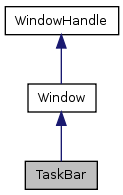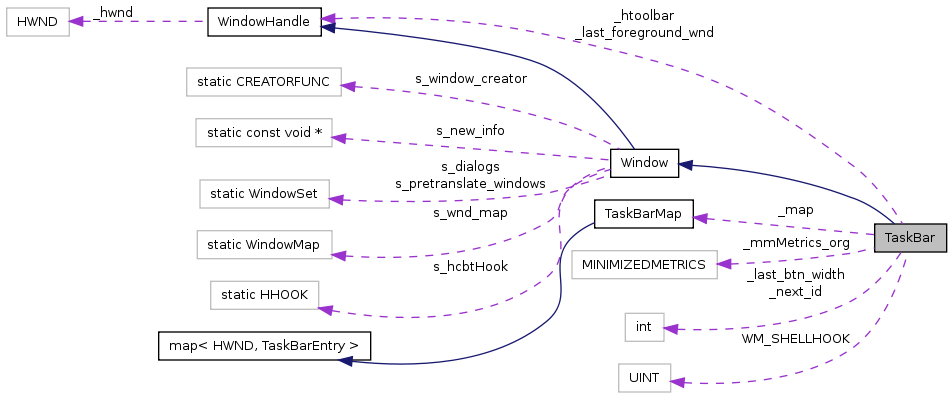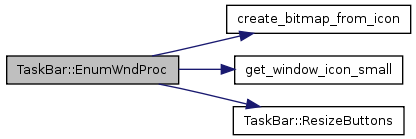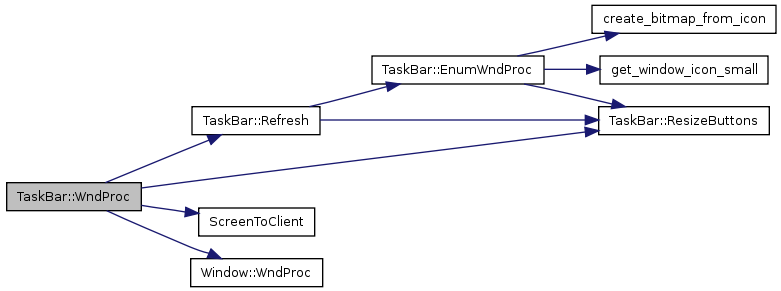Taskbar window. More...
#include <taskbar.h>


Public Types | |
| typedef Window | super |
Public Member Functions | |
| TaskBar (HWND hwnd) | |
| ~TaskBar () | |
Static Public Member Functions | |
| static HWND | Create (HWND hwndParent) |
Protected Member Functions | |
| LRESULT | Init (LPCREATESTRUCT pcs) |
| LRESULT | WndProc (UINT nmsg, WPARAM wparam, LPARAM lparam) |
| int | Command (int id, int code) |
| int | Notify (int id, NMHDR *pnmh) |
| void | ActivateApp (TaskBarMap::iterator it, bool can_minimize=true, bool can_restore=true) |
| void | ShowAppSystemMenu (TaskBarMap::iterator it) |
| void | Refresh () |
| void | ResizeButtons () |
Static Protected Member Functions | |
| static BOOL CALLBACK | EnumWndProc (HWND hwnd, LPARAM lparam) |
Protected Attributes | |
| WindowHandle | _htoolbar |
| TaskBarMap | _map |
| int | _next_id |
| WindowHandle | _last_foreground_wnd |
| int | _last_btn_width |
| MINIMIZEDMETRICS | _mmMetrics_org |
| const UINT | WM_SHELLHOOK |
Detailed Description
Taskbar window.
Definition at line 73 of file taskbar.h.
Member Typedef Documentation
| typedef Window TaskBar::super |
Constructor & Destructor Documentation
| TaskBar::TaskBar | ( | HWND | hwnd ) |
Definition at line 70 of file taskbar.cpp.
References _last_btn_width, and _mmMetrics_org.
: super(hwnd), WM_SHELLHOOK(RegisterWindowMessage(WINMSG_SHELLHOOK)) { _last_btn_width = 0; _mmMetrics_org.cbSize = sizeof(MINIMIZEDMETRICS); SystemParametersInfo(SPI_GETMINIMIZEDMETRICS, sizeof(_mmMetrics_org), &_mmMetrics_org, 0); // configure the window manager to hide windows when they are minimized // This is neccessary to enable shell hook messages. if (!(_mmMetrics_org.iArrange & ARW_HIDE)) { MINIMIZEDMETRICS _mmMetrics_new = _mmMetrics_org; _mmMetrics_new.iArrange |= ARW_HIDE; SystemParametersInfo(SPI_SETMINIMIZEDMETRICS, sizeof(_mmMetrics_new), &_mmMetrics_new, 0); } }
| TaskBar::~TaskBar | ( | ) |
Definition at line 91 of file taskbar.cpp.
References WindowHandle::_hwnd, _mmMetrics_org, g_DeregisterShellHookWindow, and g_SetTaskmanWindow.
{
// if (g_RegisterShellHook)
// (*g_RegisterShellHook)(_hwnd, RSH_UNREGISTER);
if (g_DeregisterShellHookWindow)
(*g_DeregisterShellHookWindow)(_hwnd);
else
KillTimer(_hwnd, 0);
if (g_SetTaskmanWindow)
(*g_SetTaskmanWindow)(0);
SystemParametersInfo(SPI_GETMINIMIZEDMETRICS, sizeof(_mmMetrics_org), &_mmMetrics_org, 0);
}
Member Function Documentation
| void TaskBar::ActivateApp | ( | TaskBarMap::iterator | it, |
| bool | can_minimize = true, |
||
| bool | can_restore = true |
||
| ) | [protected] |
Definition at line 280 of file taskbar.cpp.
References _last_foreground_wnd, HWND, and Refresh().
Referenced by Command(), Notify(), and ShowAppSystemMenu().
{
HWND hwnd = it->first;
bool minimize_it = can_minimize && !IsIconic(hwnd) &&
(hwnd==GetForegroundWindow() || hwnd==_last_foreground_wnd);
// switch to selected application window
if (can_restore && !minimize_it)
if (IsIconic(hwnd))
PostMessage(hwnd, WM_SYSCOMMAND, SC_RESTORE, 0);
// In case minimize_it is true, we _have_ to switch to the app before
// posting SW_MINIMIZE to be compatible with some applications (e.g. "Sleipnir")
SetForegroundWindow(hwnd);
if (minimize_it) {
PostMessage(hwnd, WM_SYSCOMMAND, SC_MINIMIZE, 0);
_last_foreground_wnd = 0;
} else
_last_foreground_wnd = hwnd;
Refresh();
}


| int TaskBar::Command | ( | int | id, |
| int | code | ||
| ) | [protected, virtual] |
Reimplemented from Window.
Definition at line 229 of file taskbar.cpp.
References _map, ActivateApp(), Window::Command(), and TaskBarMap::find_id().
{
TaskBarMap::iterator found = _map.find_id(id);
if (found != _map.end()) {
ActivateApp(found);
return 0;
}
return super::Command(id, code);
}

Definition at line 107 of file taskbar.cpp.
References CLASSNAME_TASKBAR, NOTIFYAREA_WIDTH_DEF, TITLE_TASKBAR, and WINDOW_CREATOR.
{
ClientRect clnt(hwndParent);
int taskbar_pos = 80; // This start position will be adjusted in DesktopBar::Resize().
return Window::Create(WINDOW_CREATOR(TaskBar), 0,
BtnWindowClass(CLASSNAME_TASKBAR), TITLE_TASKBAR,
WS_CHILD|WS_VISIBLE | CCS_TOP|CCS_NODIVIDER|CCS_NORESIZE,
taskbar_pos, 0, clnt.right-taskbar_pos-(NOTIFYAREA_WIDTH_DEF+1), clnt.bottom, hwndParent);
}
| BOOL CALLBACK TaskBar::EnumWndProc | ( | HWND | hwnd, |
| LPARAM | lparam | ||
| ) | [static, protected] |
Definition at line 374 of file taskbar.cpp.
References TaskBarEntry::_bmp_idx, TaskBarEntry::_btn_idx, TaskBarEntry::_fsState, TaskBarEntry::_hbmp, _htoolbar, TaskBarEntry::_id, _last_foreground_wnd, _map, _next_id, TaskBarEntry::_title, TaskBarEntry::_used, BUFFER_LEN, create_bitmap_from_icon(), get_window_icon_small(), HWND, and ResizeButtons().
Referenced by Refresh().
{
TaskBar* pThis = (TaskBar*)lparam;
DWORD style = GetWindowStyle(hwnd);
DWORD ex_style = GetWindowExStyle(hwnd);
if ((style&WS_VISIBLE) && !(ex_style&WS_EX_TOOLWINDOW) &&
!GetParent(hwnd) && !GetWindow(hwnd,GW_OWNER)) {
TCHAR title[BUFFER_LEN];
if (!GetWindowText(hwnd, title, BUFFER_LEN))
title[0] = '\0';
TaskBarMap::iterator found = pThis->_map.find(hwnd);
int last_id = 0;
if (found != pThis->_map.end()) {
last_id = found->second._id;
if (!last_id)
found->second._id = pThis->_next_id++;
} else {
HBITMAP hbmp;
HICON hIcon = get_window_icon_small(hwnd);
BOOL delete_icon = FALSE;
if (!hIcon) {
hIcon = LoadIcon(0, IDI_APPLICATION);
delete_icon = TRUE;
}
if (hIcon) {
hbmp = create_bitmap_from_icon(hIcon, GetSysColorBrush(COLOR_BTNFACE), WindowCanvas(pThis->_htoolbar));
if (delete_icon)
DestroyIcon(hIcon); // some icons can be freed, some not - so ignore any error return of DestroyIcon()
} else
hbmp = 0;
TBADDBITMAP ab = {0, (UINT_PTR)hbmp};
int bmp_idx = SendMessage(pThis->_htoolbar, TB_ADDBITMAP, 1, (LPARAM)&ab);
TaskBarEntry entry;
entry._id = pThis->_next_id++;
entry._hbmp = hbmp;
entry._bmp_idx = bmp_idx;
entry._title = title;
pThis->_map[hwnd] = entry;
found = pThis->_map.find(hwnd);
}
TBBUTTON btn = {-2/*I_IMAGENONE*/, 0, TBSTATE_ENABLED/*|TBSTATE_ELLIPSES*/, BTNS_BUTTON, {0, 0}, 0, 0};
TaskBarEntry& entry = found->second;
++entry._used;
btn.idCommand = entry._id;
HWND foreground = GetForegroundWindow();
HWND foreground_owner = GetWindow(foreground, GW_OWNER);
if (hwnd==foreground || hwnd==foreground_owner) {
btn.fsState |= TBSTATE_PRESSED|TBSTATE_CHECKED;
pThis->_last_foreground_wnd = hwnd;
}
if (!last_id) {
// create new toolbar buttons for new windows
if (title[0])
btn.iString = (INT_PTR)title;
btn.iBitmap = entry._bmp_idx;
entry._btn_idx = SendMessage(pThis->_htoolbar, TB_BUTTONCOUNT, 0, 0);
SendMessage(pThis->_htoolbar, TB_INSERTBUTTON, entry._btn_idx, (LPARAM)&btn);
pThis->ResizeButtons();
} else {
// refresh attributes of existing buttons
if (btn.fsState != entry._fsState)
SendMessage(pThis->_htoolbar, TB_SETSTATE, entry._id, MAKELONG(btn.fsState,0));
if (entry._title != title) {
TBBUTTONINFO info;
info.cbSize = sizeof(TBBUTTONINFO);
info.dwMask = TBIF_TEXT;
info.pszText = title;
SendMessage(pThis->_htoolbar, TB_SETBUTTONINFO, entry._id, (LPARAM)&info);
entry._title = title;
}
}
entry._fsState = btn.fsState;
#ifdef __REACTOS__ // now handled by activating the ARW_HIDE flag with SystemParametersInfo(SPI_SETMINIMIZEDMETRICS)
// move minimized windows out of sight
if (IsIconic(hwnd)) {
RECT rect;
GetWindowRect(hwnd, &rect);
if (rect.bottom > 0)
SetWindowPos(hwnd, 0, -32000, -32000, 0, 0, SWP_NOSIZE|SWP_NOZORDER|SWP_NOACTIVATE);
}
#endif
}
return TRUE;
}


| LRESULT TaskBar::Init | ( | LPCREATESTRUCT | pcs ) | [protected, virtual] |
Reimplemented from Window.
Definition at line 119 of file taskbar.cpp.
References _htoolbar, WindowHandle::_hwnd, _next_id, g_RegisterShellHookWindow, g_SetTaskmanWindow, IDC_FIRST_APP, IDW_TASKTOOLBAR, Window::Init(), LOG, Refresh(), TASKBUTTONWIDTH_MAX, and TEXT.
{
if (super::Init(pcs))
return 1;
/* FIXME: There's an internal padding for non-flat toolbar. Get rid of it somehow. */
_htoolbar = CreateToolbarEx(_hwnd,
WS_CHILD|WS_VISIBLE|WS_CLIPSIBLINGS|WS_CLIPCHILDREN|
CCS_TOP|CCS_NODIVIDER|TBSTYLE_LIST|TBSTYLE_TOOLTIPS|TBSTYLE_WRAPABLE,//|TBSTYLE_AUTOSIZE
IDW_TASKTOOLBAR, 0, 0, 0, NULL, 0, 0, 0, 16, 16, sizeof(TBBUTTON));
SendMessage(_htoolbar, TB_SETBUTTONWIDTH, 0, MAKELONG(TASKBUTTONWIDTH_MAX,TASKBUTTONWIDTH_MAX));
//SendMessage(_htoolbar, TB_SETEXTENDEDSTYLE, 0, TBSTYLE_EX_MIXEDBUTTONS);
//SendMessage(_htoolbar, TB_SETDRAWTEXTFLAGS, DT_CENTER|DT_VCENTER, DT_CENTER|DT_VCENTER);
//SetWindowFont(_htoolbar, GetStockFont(ANSI_VAR_FONT), FALSE);
//SendMessage(_htoolbar, TB_SETPADDING, 0, MAKELPARAM(8,8));
#ifndef __MINGW32__ // TBMETRICS missing in MinGW (as of 20.09.2005)
// set metrics for the Taskbar toolbar to enable button spacing
TBMETRICS metrics;
metrics.cbSize = sizeof(TBMETRICS);
metrics.dwMask = TBMF_BARPAD | TBMF_BUTTONSPACING;
metrics.cxBarPad = 0;
metrics.cyBarPad = 0;
metrics.cxButtonSpacing = 3;
metrics.cyButtonSpacing = 3;
SendMessage(_htoolbar, TB_SETMETRICS, 0, (LPARAM)&metrics);
#endif
_next_id = IDC_FIRST_APP;
// register the taskbar window as task manager window to make the following call to RegisterShellHookWindow working
if (g_SetTaskmanWindow)
(*g_SetTaskmanWindow)(_hwnd);
if (g_RegisterShellHookWindow) {
LOG(TEXT("Using shell hooks for notification of shell events."));
(*g_RegisterShellHookWindow)(_hwnd);
} else {
LOG(TEXT("Shell hooks not available."));
SetTimer(_hwnd, 0, 200, NULL);
}
/* Alternatively we could use the RegisterShellHook() function in SHELL32, but this is not yet implemented in the WINE code.
if (g_RegisterShellHook) {
(*g_RegisterShellHook)(0, RSH_REGISTER);
if ((HIWORD(GetVersion())>>14) == W_VER_NT)
(*g_RegisterShellHook)(_hwnd, RSH_REGISTER_TASKMAN);
else
(*g_RegisterShellHook)(_hwnd, RSH_REGISTER);
}
*/
Refresh();
return 0;
}

| int TaskBar::Notify | ( | int | id, |
| NMHDR * | pnmh | ||
| ) | [protected, virtual] |
Reimplemented from Window.
Definition at line 241 of file taskbar.cpp.
References _htoolbar, _map, ActivateApp(), TaskBarMap::find_id(), Window::Notify(), ScreenToClient(), ShowAppSystemMenu(), and TEXT.
{
if (pnmh->hwndFrom == _htoolbar)
switch(pnmh->code) {
case NM_RCLICK: {
TBBUTTONINFO btninfo;
TaskBarMap::iterator it;
Point pt(GetMessagePos());
ScreenToClient(_htoolbar, &pt);
btninfo.cbSize = sizeof(TBBUTTONINFO);
btninfo.dwMask = TBIF_BYINDEX|TBIF_COMMAND;
int idx = SendMessage(_htoolbar, TB_HITTEST, 0, (LPARAM)&pt);
if (idx>=0 &&
SendMessage(_htoolbar, TB_GETBUTTONINFO, idx, (LPARAM)&btninfo)!=-1 &&
(it=_map.find_id(btninfo.idCommand))!=_map.end()) {
//TaskBarEntry& entry = it->second;
ActivateApp(it, false, false); // don't restore minimized windows on right button click
#ifndef __MINGW32__ // SHRestricted() missing in MinGW (as of 29.10.2003)
static DynamicFct<DWORD(STDAPICALLTYPE*)(RESTRICTIONS)> pSHRestricted(TEXT("SHELL32"), "SHRestricted");
if (pSHRestricted && !(*pSHRestricted)(REST_NOTRAYCONTEXTMENU))
#endif
ShowAppSystemMenu(it);
}
break;}
default:
return super::Notify(id, pnmh);
}
return 0;
}

| void TaskBar::Refresh | ( | ) | [protected] |
Definition at line 488 of file taskbar.cpp.
References TaskBarEntry::_bmp_idx, TaskBarEntry::_btn_idx, TaskBarEntry::_hbmp, _htoolbar, TaskBarEntry::_id, _map, TaskBarEntry::_used, EnumWndProc(), and ResizeButtons().
Referenced by ActivateApp(), Init(), and WndProc().
{
for(TaskBarMap::iterator it=_map.begin(); it!=_map.end(); ++it)
it->second._used = 0;
EnumWindows(EnumWndProc, (LPARAM)this);
//EnumDesktopWindows(GetThreadDesktop(GetCurrentThreadId()), EnumWndProc, (LPARAM)_htoolbar);
set<int> btn_idx_to_delete;
set<HBITMAP> hbmp_to_delete;
for(TaskBarMap::iterator it=_map.begin(); it!=_map.end(); ++it) {
TaskBarEntry& entry = it->second;
if (!entry._used && entry._id) {
// store button indexes to remove
btn_idx_to_delete.insert(entry._btn_idx);
hbmp_to_delete.insert(entry._hbmp);
entry._id = 0;
}
}
if (!btn_idx_to_delete.empty()) {
// remove buttons from right to left
for(set<int>::reverse_iterator it=btn_idx_to_delete.rbegin(); it!=btn_idx_to_delete.rend(); ++it) {
int idx = *it;
SendMessage(_htoolbar, TB_DELETEBUTTON, idx, 0);
for(TaskBarMap::iterator it=_map.begin(); it!=_map.end(); ++it) {
TaskBarEntry& entry = it->second;
// adjust button indexes
if (entry._btn_idx > idx) {
--entry._btn_idx;
--entry._bmp_idx;
TBBUTTONINFO info;
info.cbSize = sizeof(TBBUTTONINFO);
info.dwMask = TBIF_IMAGE;
info.iImage = entry._bmp_idx;
SendMessage(_htoolbar, TB_SETBUTTONINFO, entry._id, (LPARAM)&info);
}
}
}
for(set<HBITMAP>::iterator it=hbmp_to_delete.begin(); it!=hbmp_to_delete.end(); ++it) {
HBITMAP hbmp = *it;
TBREPLACEBITMAP tbrepl = {0, (UINT_PTR)hbmp, 0, 0};
SendMessage(_htoolbar, TB_REPLACEBITMAP, 0, (LPARAM)&tbrepl);
DeleteObject(hbmp);
for(TaskBarMap::iterator it=_map.begin(); it!=_map.end(); ++it)
if (it->second._hbmp == hbmp) {
_map.erase(it);
break;
}
}
ResizeButtons();
}
}


| void TaskBar::ResizeButtons | ( | ) | [protected] |
Definition at line 564 of file taskbar.cpp.
References _htoolbar, WindowHandle::_hwnd, _last_btn_width, _map, TASKBUTTONWIDTH_MAX, and TASKBUTTONWIDTH_MIN.
Referenced by EnumWndProc(), Refresh(), and WndProc().
{
int btns = _map.size();
if (btns > 0) {
int bar_width = ClientRect(_hwnd).right;
int btn_width = (bar_width / btns) - 3;
if (btn_width < TASKBUTTONWIDTH_MIN)
btn_width = TASKBUTTONWIDTH_MIN;
else if (btn_width > TASKBUTTONWIDTH_MAX)
btn_width = TASKBUTTONWIDTH_MAX;
if (btn_width != _last_btn_width) {
_last_btn_width = btn_width;
SendMessage(_htoolbar, TB_SETBUTTONWIDTH, 0, MAKELONG(btn_width,btn_width));
SendMessage(_htoolbar, TB_AUTOSIZE, 0, 0);
}
}
}

| void TaskBar::ShowAppSystemMenu | ( | TaskBarMap::iterator | it ) | [protected] |
Definition at line 305 of file taskbar.cpp.
References WindowHandle::_hwnd, and ActivateApp().
Referenced by Notify().
{
HMENU hmenu = GetSystemMenu(it->first, FALSE);
if (hmenu) {
POINT pt;
GetCursorPos(&pt);
int cmd = TrackPopupMenu(hmenu, TPM_LEFTBUTTON|TPM_RIGHTBUTTON|TPM_RETURNCMD, pt.x, pt.y, 0, _hwnd, NULL);
if (cmd) {
ActivateApp(it, false, false); // reactivate window after the context menu has closed
PostMessage(it->first, WM_SYSCOMMAND, cmd, 0);
}
}
}


| LRESULT TaskBar::WndProc | ( | UINT | nmsg, |
| WPARAM | wparam, | ||
| LPARAM | lparam | ||
| ) | [protected, virtual] |
Reimplemented from Window.
Definition at line 181 of file taskbar.cpp.
References _htoolbar, _last_foreground_wnd, HWND, PM_GET_LAST_ACTIVE, Refresh(), ResizeButtons(), ScreenToClient(), WM_SHELLHOOK, and Window::WndProc().
{
switch(nmsg) {
case WM_SIZE:
SendMessage(_htoolbar, WM_SIZE, 0, 0);
ResizeButtons();
break;
case WM_TIMER:
Refresh();
return 0;
case WM_CONTEXTMENU: {
Point pt(lparam);
ScreenToClient(_htoolbar, &pt);
if ((HWND)wparam==_htoolbar && SendMessage(_htoolbar, TB_HITTEST, 0, (LPARAM)&pt)>=0)
break; // avoid displaying context menu for application button _and_ desktop bar at the same time
goto def;}
case PM_GET_LAST_ACTIVE:
return (LRESULT)(HWND)_last_foreground_wnd;
default: def:
if (nmsg == WM_SHELLHOOK) {
switch(wparam) {
case HSHELL_WINDOWCREATED:
case HSHELL_WINDOWDESTROYED:
case HSHELL_WINDOWACTIVATED:
case HSHELL_REDRAW:
#ifdef HSHELL_FLASH
case HSHELL_FLASH:
#endif
#ifdef HSHELL_RUDEAPPACTIVATED
case HSHELL_RUDEAPPACTIVATED:
#endif
Refresh();
break;
}
} else {
return super::WndProc(nmsg, wparam, lparam);
}
}
return 0;
}

Member Data Documentation
WindowHandle TaskBar::_htoolbar [protected] |
Definition at line 83 of file taskbar.h.
Referenced by EnumWndProc(), Init(), Notify(), Refresh(), ResizeButtons(), and WndProc().
int TaskBar::_last_btn_width [protected] |
Definition at line 87 of file taskbar.h.
Referenced by ResizeButtons(), and TaskBar().
WindowHandle TaskBar::_last_foreground_wnd [protected] |
Definition at line 86 of file taskbar.h.
Referenced by ActivateApp(), EnumWndProc(), and WndProc().
TaskBarMap TaskBar::_map [protected] |
Definition at line 84 of file taskbar.h.
Referenced by Command(), EnumWndProc(), Notify(), Refresh(), and ResizeButtons().
MINIMIZEDMETRICS TaskBar::_mmMetrics_org [protected] |
Definition at line 88 of file taskbar.h.
Referenced by TaskBar(), and ~TaskBar().
int TaskBar::_next_id [protected] |
Definition at line 85 of file taskbar.h.
Referenced by EnumWndProc(), and Init().
const UINT TaskBar::WM_SHELLHOOK [protected] |
The documentation for this struct was generated from the following files:
